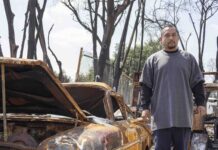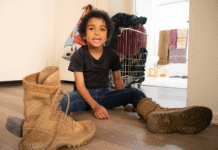Laura Gonzalez
The feast was about to begin.
Tables full of uncooked food, bread, fresh fruits and vegetables, were placed in the backyard. Yet, there were still a few items that Melanie had to pick up at the Farmers Market. Everything she got there was destined to go to the trash, but she salvaged it. She returned to the house where she cooked the food with the rest of her makeshift family. Every Sunday you can find them at Reseda Park with the provisions, clothes and items that they find, handing them out to people who need it.
These group of students are part of Food Not Bombs, an organization that was created in 1980 as a protest against war. The group also identifies themselves with the freeganism lifestyle.
Freegans believe that by buying food they are supporting corporations that violate human rights, damage the environment and abuse animals. They are trying to impact the economic system by eating food that would otherwise be thrown away.
For freegans, dumpster diving is a natural urge. The movement’s main idea is that food cannot be wasted. They rummage through the garbage looking for rejected treasures.
“[At summer school] I would get really hungry and I would just start to roam out on school. I would look in every single trash can to see if I can find stuff,” Stephanie Cabrera said. “I found lunch bags and half-eaten things.”
They look for food everywhere, but they are hungrier for change. The majority of the members of the group are self-proclaimed anarchists. They feel they need to feed the poor because the government will never do it.
“Right now, we have Darwinian capitalism where people are starting to eat each other the monetary way, where the bigger fish is trying to eat up everything now,” Nick Napolitano, 23, said. “It happened with the great depression. Wealth becomes consolidated and stays that way so, we have this window in time to change things.”
Their ideology is strong and it is embedded in everything they do. They make sure everyone knows they are not affiliated with a church.
“It is building community, it is not like a church or some other type of charity where it’s like we help you, we all come together and we help each other,” said Melanie Kaplan.
When asked if she is an anarchist, Melanie Kaplan said in a piercing voice without hesitation “yes.” She has her own reasons to describe the movement.
“I believe in individual freedom. I believe everyone should have the right to do whatever they want to and I also believe in mutual aid where instead of acting like we are against each other, we act like we are a family to help each other,” explained Melanie Kaplan.
People from different age groups and different race groups come every Sunday to Reseda Park in order to fill their empty stomachs. Many of the people that come to the park are struggling make ends meet due to the country’s economic crisis.
“I clean houses about two to three times a week, but I usually struggle to pay the rent,” said Gloria Ferman, who is one of the people that benefits from the items that Food Not Bombs distribute at the park.
Amid the piles of food scraps, Ferman has also found second-hand clothing that she takes home, washes and gives to her daughters to wear.
“Recently we started doing the free-store, so we will bring clothes or any miscellaneous items that are in our house that we don’t need and we will just give that away for free,” said Melanie Kaplan.
The majority of the people at the Farmers Market were open to the idea when Melanie first brought it to them about a year ago. She says that most people are very nice and are willing to help the cause, but there are some people that make it difficult for them.
“Sometimes we have come into some problems when people are rude like ‘Oh, you are taking our trash’ kinda thing,” said Melanie Kaplan, who started the San Fernando Valley chapter of Food Not Bombs just over a year ago.
Melanie’s parents are very supportive of the work she does and try to help her in every way they can.
“I am very proud that these kids every single Sunday, rain or shine, they come together, make a meal and give to the less fortunate,” said Sandy Kaplan, Melanie’s mom.
“It chokes me up, when you see the people that come and they are so appreciative.”
This group is trying to create their own society, a society that does not need government to exist. They create their own rules and try to help others as much as they can, or in their own words, “it’s about building community.”
“Strong communities build strong worlds and there is enough room in the world to have many types of communities and that’s what we need,” said Napolitano. “We have to acknowledge that we are not all the same but that’s okay. We just need to be able to work together to build something new.”

()

()

()



